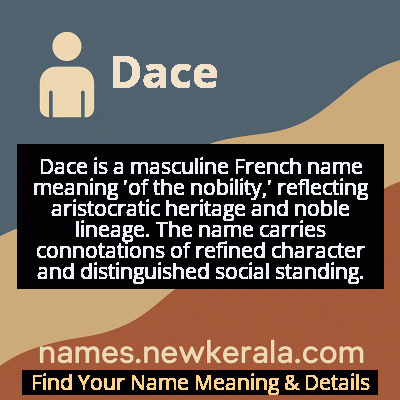Dace Name Meaning & Details
Origin, Popularity, Numerology Analysis & Name Meaning of Dace
Discover the origin, meaning, and cultural significance of the name DACE. Delve into its historical roots and explore the lasting impact it has had on communities and traditions.
Name
Dace
Gender
Male
Origin
French
Lucky Number
4
Meaning of the Name - Dace
Dace is a masculine French name meaning 'of the nobility,' reflecting aristocratic heritage and noble lineage. The name carries connotations of refined character and distinguished social standing.
Dace - Complete Numerology Analysis
Your Numerology Number
Based on Pythagorean Numerology System
Ruling Planet
Uranus (Rahu)
Positive Nature
Strong sense of order, loyal, practical, and disciplined.
Negative Traits
Stubborn, overly serious, rigid, and prone to feeling restricted.
Lucky Colours
Blue, gray.
Lucky Days
Saturday.
Lucky Stones
Blue sapphire.
Harmony Numbers
1, 7, 8.
Best Suited Professions
Managers, engineers, accountants, organizers.
What People Like About You
Dependability, discipline, practicality.
Famous People Named Dace
Dace Melbārde
Politician
Latvian Minister of Culture and Member of European Parliament
Dace Akmentiņa
Actress
Prominent Latvian theater and film actress
Dace Lūse
Artist
Latvian painter known for expressive figurative works
Name Variations & International Equivalents
Click on blue names to explore their detailed meanings. Gray names with will be available soon.
Cultural & Historical Significance
The name's usage across different cultures demonstrates how naming traditions evolve while maintaining connections to concepts of beauty, purity, and elevated social status. In French context, the masculine form Dace would have been used among noble families to signify their distinguished heritage, much like other French names with aristocratic connotations. This cross-cultural journey of the name highlights how naming practices adapt to different linguistic and social environments while preserving core symbolic meanings.
Extended Personality Analysis
Individuals named Dace are often perceived as possessing refined qualities associated with nobility - they tend to demonstrate natural leadership abilities, diplomatic skills, and a certain elegance in their demeanor. These individuals typically exhibit strong moral character, integrity, and a sense of responsibility toward others, reflecting the noble heritage suggested by their name. There's often an air of quiet confidence about them, combined with intellectual curiosity and artistic sensibilities that make them well-rounded individuals.
In social settings, people named Dace often display excellent communication skills and emotional intelligence, allowing them to navigate complex interpersonal dynamics with grace. They tend to be protective of those they care about and demonstrate loyalty in their relationships. While they may carry themselves with a certain dignified reserve, this often masks a warm, compassionate nature that emerges in trusted company. Their combination of practical wisdom and idealistic principles makes them effective in leadership roles where both pragmatism and vision are required.
Modern Usage & Popularity
In contemporary naming practices, Dace remains quite rare, particularly as a masculine name in French context, which contributes to its distinctive appeal for parents seeking unique yet historically meaningful names. While the name maintains stronger traditional usage in Latvia and other Baltic countries as a feminine name, the masculine French version has experienced occasional revival among families with French heritage or those who appreciate its noble connotations and elegant simplicity. The name's scarcity in modern birth records makes it an excellent choice for parents wanting a name that stands out without being overly unconventional, while still carrying the weight of aristocratic tradition and cultural heritage that many find appealing for their sons in an era where distinctive yet meaningful names are increasingly valued.
Symbolic & Spiritual Meanings
The name Dace carries rich symbolic meanings that bridge natural beauty and aristocratic dignity. Primarily symbolizing nobility of character and social standing, it represents ideals of honor, integrity, and elevated purpose that transcend mere birthright to encompass moral excellence and leadership qualities. Like the daisy flower from which its Baltic variation derives, it also embodies purity, innocence, simplicity, and new beginnings - creating a fascinating duality between aristocratic sophistication and natural, unpretentious beauty. This combination of meanings suggests someone who carries themselves with dignity while maintaining connection to fundamental human values and natural wisdom, making the name symbolically represent balanced leadership that honors both tradition and authenticity.

